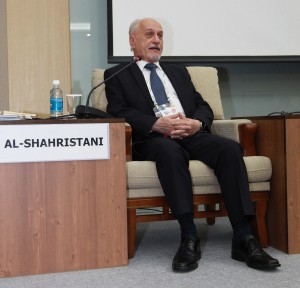Even though the area boasts 57% of the world’s known oil and gas reserves, it faces the same challenges as energy poor parts of the world when it comes to supplying its people with secure, environmentally sustainable, and affordable energy.
“Egypt needs gas and has reserves,” said John Barry, Country Chair Abu Dhabi of Shell Upstream International, “but it has no incentives to develop these resources because doing so would entail higher costs than importing gas that is already available. This is a case of affordability versus security.”
Other speakers at the Middle East and North Africa session pointed to social as well as geographical imbalances in the region’s energy picture. “Countries in the region are providing energy at subsidized rates for the poorest of their people but they could run out of export potential in the next 20 years,” said Wadie Habboush, President & CEO of the Habboush Group.
Iraqi Deputy Prime Minister for Energy, Hussain Al-Shahristani stated, “We need to move to market prices.” He added that a situation in which one-third of a country’s oil is sold domestically at nominal prices is economically unsustainable. “But with the current social upheavals moving to market prices will be difficult.”
Thani Al-Zeyoudi, Director of the Emirati Directorate of Energy and Climate Change (DECC), said, “We are encouraging people to reduce consumption on air conditioning and transport. We are cooperating with South Korea in nuclear energy.” Zeyoudi pointed to the subsidies as a reason for moving to nuclear to generate electricity in a petroleum rich region. By generating electricity from nuclear power, the UAE hopes to be able to sell at world prices the petroleum it now makes available at home below market rates.
Adnan Shahid-Eldin, former OPEC Secretary General asked why one country “flares gas” from its oil fields, burning it off because it is too cheap to develop while other parts of the region need to import the same commodity: “Why is the region not thinking of integration? Why cannot Algeria sell to Tunisia or Morocco?” Barry responded that the pipelines are pointing in the wrong direction: “Where the gas flows is determined by market conditions.” Algeria and Qatar have long-term contracts with buyers from outside the region.
Kamel Eddine Chikhi, Executive Director of Algeria’s Sonatrach said, “We are developing more and more our gas industry, expanding in the Southwest area. In the sub-Sahara region air conditioning is a must.”

Imbalances not only in natural but also human resources were raised by speakers. “We have been around for 40 years and yet we do not have adequate human resources in our oil industry,” said Iraq’s Al-Shahristani. UAE’s Al-Zeyoudi stated, “We ask the international oil companies to hire 85% local staff and if they cannot find locals then to train them. Most social unrest is the result of unemployment.” Algeria’s Chikhi said, “The international oil companies have to invest in our people.”
This news story is based on the session Regional Crossroads, “MENA: Serving a triple agenda - International supply, local energy growth, and need for job creation”, at the 2013 World Energy Congress.





